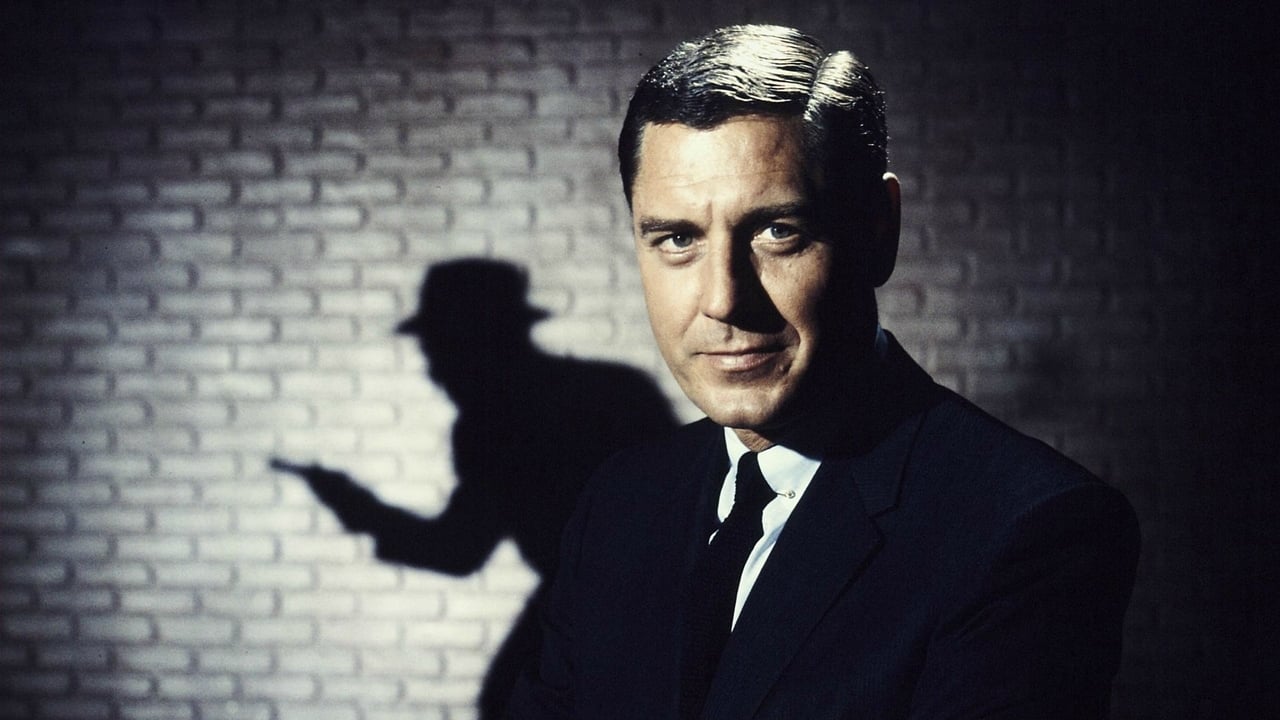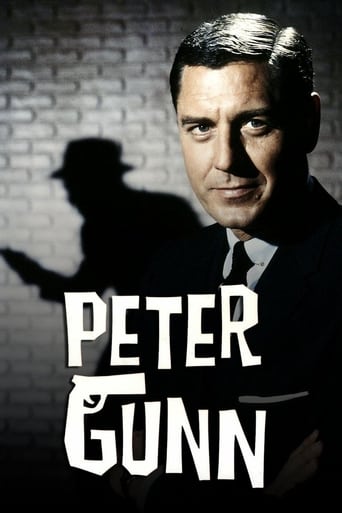

Stylish but barely mediocre overall
... View MoreExcellent, a Must See
... View MoreEach character in this movie — down to the smallest one — is an individual rather than a type, prone to spontaneous changes of mood and sometimes amusing outbursts of pettiness or ill humor.
... View MoreStory: It's very simple but honestly that is fine.
... View More"Bang! Bang! Shoot! Shoot!"When it comes to the likes of no-nonsense, smooth-talking L.A. gumshoes - Peter Gunn (a very sexually suggestive name) was (Indeed) the coolest, the calmest, and, yes, the most collected P.I. of them all.Featuring lots of snappy dialogue, jazzy music, and the recurring elements of "Noir" thrown into the mix for good measure - This entertaining, tough-as-nails, TV crime show was impressively created by Blake Edwards.Filmed in stark b&w - Peter Gunn starred Craig Stevens as the title character. This show ran from the years 1958-1961.
... View MorePeter Gunn, the TV series, ran three television seasons, 1958 – 1961, a total of 114 episodes, 38 episodes per season, a thirty-minute drama televised once a week, beginning in the fall of 1958, Season 1, Episode 1, was September 22, 1958. The series ran until the last episode televised was on September 18, 1961. The star was Craig Stevens, appearing in all 114 episodes, and co-starring in primary recurring roles included Herschel Bernardi as Lt. Jacoby, 102 episodes, and Lola Albright as Edie Hart, 84 episodes. Other recurring roles were offered by Bill Chadney as Emmett (piano player at Mother's), with 42 episodes and two actresses in the same role, a total of 45 episodes, between Hope Emerson, 27 episodes, and Minerva Urecal, 18 episodes. A definitive, collaborate effort making the series a success was from Henri Mancini's Grammy Award winning music for the entire series, with the piano played by the future award-winning John Williams. Series creator and producer was Blake Edwards where Blake also wrote and directed episodes throughout the series. Blake cut his teeth on Peter Gunn and certainly went on to success in films and television. The Peter Gunn drama was set in a non-specified city, usually at night, with a private investigator searching for and bringing the perpetrator(s) to a justifiable end, often with a late assist, sometimes timely assist, of a certain police lieutenant Jacoby. The scenes included a stop at the quaint waterfront nightclub named Mother's, that included a songstress Edie, who had a mutual attraction to our Peter Gunn. The title character's portrayal would have been given a thumbs-up by the definition of cool, Steve McQueen. Craig Stevens played the lead role superbly each week, working with whatever script he was handed, and for late fifties television in a half an hour setting, well done Mr. Stevens. The jazz music setting with professional recurring character roles played quite well by the chosen actors and actresses made the series work for its 114 episodes. The viewer has to pay attention from the start since there are no introductory credits, a brief prologue, then with Mancini's theme music, the screen reads "Peter Gunn starring Craig Stevens" then jumping right into the action and usually there were no wasteful scenes throughout each weekly episode. Essential scenes could be in Jacoby's office, Mother's nightclub, but the primary scenery is at or near the action with the perpetrators. Each week you could have a few different roles from a variety of central casting's thespians. Of course, these other roles were usually the bad guys including some innocent characters, wrong place, wrong time. The viewer didn't know some parts were being played by what would come to be up and comers. With so many episodes per season, it left the field open to some actors that would go onto starring roles, although many continued to make a living by going wherever they were called.
... View MoreI was aware of this show when it first aired but, since I was a baby boomer, it wasn't on my allowed watch list, being an "adult TV series" in the late 50's. Finally got interested in it while listening to Mancini's music album of the same name. To say that this show was ahead of its time and a forerunner of future series is to do it a disservice. Peter Gunn was groundbreaking in the use of jazz to create the proper mood of the action on screen, and in the way it slyly spanked the censors through witty writing and heavy emotional and physical situations. It brings back memories of the old Mae West and W.C. Fields comedies in the way they battered the blue-pencils of censorship while looking oh so innocent on screen. I recall one scene where Pete is convincing a landlady to let him into the room of someone he is investigating. She asks him, "So, are you a cop?" Pete replies, "Not exactly." She says, "Oh, a private dick then?" And Pete says, "Just private." If that doesn't tickle your fancy to go watch this series from start to finish, you are missing out on one of the great treats that life has to offer. God Bless You, Blake Edwards.
... View MoreIn a way, PETER GUNN was (and is) to be enjoyed as Hollywood's own modest version of the virtues of French auteur, J.P. Melville: a dreamily nocturnal jazz-laced exercise of style over content in which the achingly desirable Lola Albright provides counterpoint sultriness to the stone-faced stoicism of Craig Stevens' Cary Grant-like Gunn.But there is one episode entitled "The Comic," starring Shelly Berman as a neurotic funnyman (Danny Arnold) who insists his wife is out to destroy him and enlists the hero's help to prevent it. The show is basically two monologues: the first one is of Arnold explaining the cause of his concerns to Gunn; the second is of a crucial portion of the nightclub stand-up act itself, in which through metaphor and analogy, it becomes increasingly more clear that it is Arnold who is a mortal threat to his wife and not the other way around. His monologue which is "killing" the audience is thus transformed in the story from being merely comic to a confession of first degree murder.Berman's performance defines what tour-de-force means and is one of the greatest (if not THE greatest) neglected acting job in the history of network television (he received no Emmy). It is also quite possibly the most personal, successfully concentrated expression by Edwards of his divided, comedic/depressive sensibility. So direct, so simple, but the final effect is enormous.That this half-hour installment is not one of the legends in the annals of the golden age of television is one of the Industry's cruelest mysteries.Rating for the Series: A generous 8for this one sterling episode: a steely 10Composite Score: 9
... View More